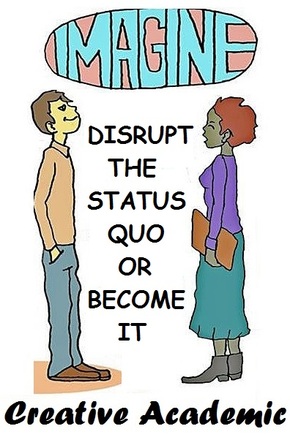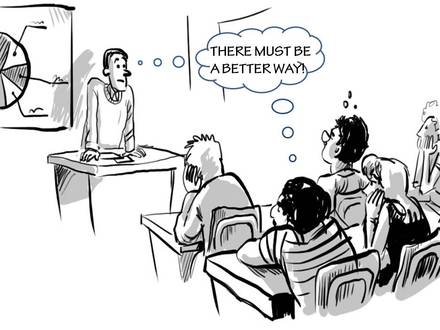
According to Clayton Christensen the really significant changes in any domain are disruptive. In his view 'to play its indispensable function function in the new competitive environment, the typical university must change more quickly and more fundamentally than it has been doing'(1).
Disrupting the status quo in order to do something that is significantly different to what has been done before is an important objective of creativity. Sadly, most universities don't like disruption, in fact they are positively risk averse: so all too often, even if we have a good idea, we play safe and shy away from possible criticism and carry on doing what we have always done because its easier and we are less likely to get criticised. Trying to be creative in order to innovate involves courage and conviction, energy, effort and time, quite apart from the ideas and vision that drives the process.
Because of these organisational cultural pressures, for many academics, the excitement of learning and the excitement of teaching and helping others learn is not always visible. But does it have to be this way? What are the consequences for us, our learners and our society as a whole if we do not take the risks associated with disrupting ourselves and the current education we provide in order to strive for something better?
I am an academic developer a role which contains within it the seeds of educational disruption - in order to advance understanding and practice! But those seeds have to be planted and helped to grow. I try to fulfil this role by teaching on programmes that lead to teaching qualifications in Higher Education, further CPD programmes, facilitating workshops and open courses but also through supporting individual colleagues and teams. At the heart of my approach is building relationships and trust with colleagues and working in partnership through modelling practices, immersion and co-creation. This, becomes a powerful vehicle for change. A while back I asked a new colleague what he loves about his job as an academic. The answer came as no surprise to me. He said research. My response was "you will need to learn to love teaching too". And my big question is how can we achieve this. How can we help academics use their love for research and experimentation and learn to love teaching? Is the answer in the question perhaps? If academics use their curiosity to make new discoveries through experimentation and research, what stops them using their curiosity to create stimulating, playful and imaginative learning experiences for them and their students?

An Open Learning Ecology
In addition to running the course internally within MMU we are also offering an open version linked to this through the Peer to Peer University (p2pu) in collaboration with Lifewide Education. We decided to do this as it will encourage others to join in and therefore extend and enrich our conversations and debates around creativity in Higher Education even further. The Creativity for Learning in Higher Education open learning ecology within p2pu is currently under construction and there will be multiple exciting ways to get involved, share experiences and make new discoveries. Have a look at https://p2pu.org/en/courses/2615/creativity-for-learning-in-higher-education/ to get a taste of what is going to start unfolding from the end of January 2015.
Collaborative inquiry
As my questions around conceptions of creativity in the context of learning and teaching are important and fundamental for current and future practices, I teamed up with Prof. Norman Jackson who has spent many years trying to understand what creativity means in higher education and encouraging universities to do more to nurture students' creative development. Much of this work is now available as an open resource on his new Creative Academic website http://www.creativeacademic.uk Norman has influenced my thinking and practice and provided a window into the world of creative and playful teaching that underpins my teaching philosophy and practice. This project will help us gain a deeper insight into the conceptions of creativity as expressed and lived by academics and also provide a useful vehicle for my own further professional development through collaborative research.
The Creative Academic project aims to explore conceptions of personal creativity in the context of learning and teaching in higher education. The project will investigate:
1) The beliefs, attitudes and values of higher education teachers in respect of their own creativity and its importance to their personal and professional identity
2) The beliefs, attitudes and values of higher education teachers in respect of their understandings of what creativity means in the context of their teaching, their curricular designs and students' development.
3) The ways in which higher education teachers encourage students to use and develop their creativity.
4) The extent to which understandings and meanings of creativity are enhanced or changed as participants try to implement their creative ideas.
While part of the project will be conducted with colleagues in my own institution and help us gain an insight into our evolving conceptions of creativity as we engage in the Creativity for Learning unit, the collaborative inquiry is also open to any higher education teacher who wants to participate. You can join us by registering your interest and completing the on-line questionnaire at http://www.creativeacademic.uk/questionnaires.html
Source
1) Christensen C. M. and Eyring H. J. (2011) The Innovative University: Changing the DNA of Higher Education from the Inside Out
Chrissie Nerrantzi
Manchester Metropolitan University
 RSS Feed
RSS Feed
